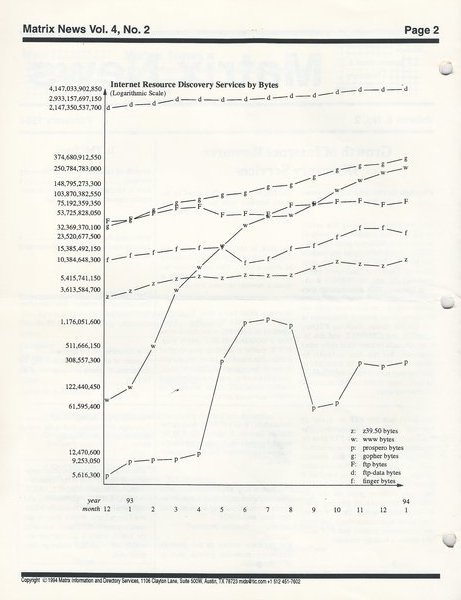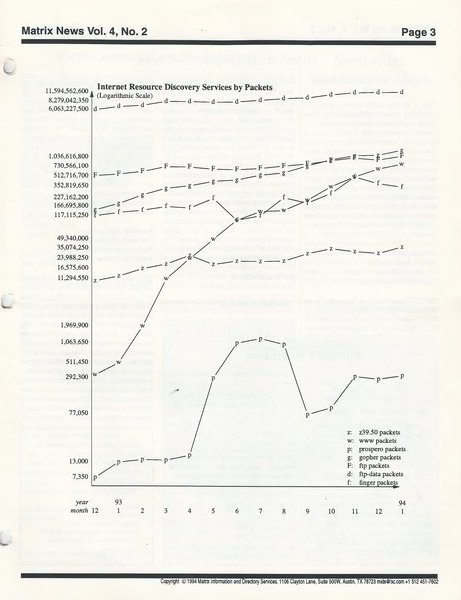Jeff Bezos sent his biographer to find the graphs; that’s when I learned about this. The Everything Store: Jeff Bezos and the Age of Amazon, Paperback, August 12, 2014, by Brad Stone (PDF, google book)
Intrigued by Shaw’s conviction about the inevitable importance of the Internet, Bezos started researching its growth. A Texas-based author and publisher named John Quarterman had recently started the Matrix News, a monthly newsletter extolling the Internet and discussing its commercial possibilities. One set of numbers in particular in the February 1994 edition of the newsletter was startling. For the first time, Quarterman broke down the growth of the year-old World Wide Web and pointed out that its simple, friendly interface appealed to a far broader audience than other Internet technologies. In one chart, he showed that the number of bytes—a set of binary digits —transmitted over the Web had increased by a factor of 2,057 between January 1993 and January 1994.

Internet Resource Discovery Services by Bytes, John S. Quarterman, Matrix News 4.2, MIDS, February 1994.Another graphic showed the number of packets—a single unit of data—sent over the Web had jumped by 2,560 in the same span.8

Internet Resource Discovery Services by Packets, John S. Quarterman, Matrix News 4.2, MIDS, February 1994.Bezos interpolated from this that Web activity overall had gone up that year by a factor of roughly 2,300—a 230,000 percent increase. “Things just don’t grow that fast,” Bezos later said. “It’s highly unusual, and that started me thinking, What kind of business plan might make sense in the context of that growth?”9 (Bezos also liked to say in speeches during Amazon’s early years that it was the Web’s “2,300 percent” annual growth rate that jolted him out of complacency. Which makes for an interesting historical footnote: Amazon began with a math error.)
8 John Quarterman, Matrix News.
9 Jeff Bezos interview, Academy of Achievement, May 4, 2001.
I’m also notoriously bad at computing percentages.
Note this part: “Matrix News, a monthly newsletter extolling the Internet and discussing its commercial possibilities.” Indeed, we were producing that newsletter (the first one ever distributed primarily over the Internet) to promote growth and commercialization of the Internet, because it had become clear that the potential was larger than governments could support alone. I had also been peripherally involved in the beginnings of the first two commercial Internet Service Providers (ISPs).
Although we knew many movers and shakers were subscribers, I don’t recall Bezos among those names, and the newsletter was passed around quite a bit. So it was only a decade later that I learned that in our goal of promoting the economic possibilities of the Internet we had succeeded beyond our wildest dreams.
Here’s a bit of irony:
Bezos concluded that a true everything store would be impractical—at least at the beginning. He made a list of twenty possible product categories, including computer software, office supplies, apparel, and music. The category that eventually jumped out at him as the best option was books. They were pure commodities; a copy of a book in one store was identical to the same book carried in another, so buyers always knew what they were getting. There were two primary distributors of books at that time, Ingram and Baker and Taylor, so a new retailer wouldn’t have to approach each of the thousands of book publishers individually. And, most important, there were three million books in print worldwide, far more than a Barnes & Noble or a Borders superstore could ever stock.
Around that same time a few of us were discussing how to turn some of this research into a startup company. One idea proposed was drop-shipping books. I shot that down as being too specialized and too few people would want it. Well, you have to hand it to Bezos for seeing there was a market.
And according to Bezos, it was Matrix News that showed him the world wide web on the Internet was the way to reach that market.
Bezos was wrong about this part: “Things just don’t grow that fast.” Well, the Internet itself did, back in 1987 and 1988, as a number of factors came together (I’ve written about that elsewhere). Internet growth, and later world wide web growth, settled down to more steady exponential growth; see A Naive Projection of the Growth of the Internet. Since then we’ve seen mobile phones and even faster smart phones go from first appearing ten years ago to most people have one in their pocket.
And U.S. solar power continues to double every two years, with similar exponential growth rates in the rest of the world. Solar power will win like the Internet did.
-jsq
Investigative reporting costs money, for open records requests, copying, web hosting, gasoline, and cameras, and with sufficient funds we can pay students to do further research. You can donate to LAKE today!
Short Link:
Pingback: A Naive Projection of the Growth of the Internet | On the LAKE front